Why Were Veteran Caregivers Censored During the Elizabeth Dole Foundation – Veterans Affairs Conference?
During the yearly Caregiver conference, co-hosted by the Department of Veterans Affairs and the Elizabeth Dole Foundation, some veteran caregivers were subjected to censorship.
It seems that the moderators aimed to censor specific community members and topics who were attempting to participate virtually through YouTube.
What topics?
Links to interim legislative policy publications revealing Veteran Warriors, and not the Elizabeth Dole Foundation, was responsible for delaying the Legacy Caregiver purge until 2025. Those lines were reportedly shadow-blocked more than once
Comments from veteran caregivers, veterans, and servicemembers on the video chat correcting misinformation shared by virtual conference attendees. Communicaty comments correcting those errors were also shadow blocked.
Why would EDF staff, an organization co-hosting the event with a federal agency, try to facilitate the spread of misinformation?
I know.
There is never a day that goes by anymore without one report or another of a groovy government-linked event resulting in censorship of some dissenter somewhere.
This makes sense.
In an environment where the federal agency in question is perpetually broken, like VA, why would federal employees or stakeholders want to hear dissenting views to fix problems?
The more the problems persist, the more taxpayers spend on government contractors and foundations like Elizabeth Dole Foundation to fix [sic] those same problems that never seem to get fixed.
I digress.
About The EDF National Convening
Called the Elizabeth Dole Foundation 8th Annual National Convening, the event was co-hosted by The Department of Veterans Affairs and Elizabeth Dole Foundation (with Triwest mentioned on the banner).
Servicemembers, veterans, and veteran caregivers were hopeful agency officials, and their partners, would address the public about the fate of The Program of Comprehensive Assistance for Family Caregivers (PCAFC). This is the VA program designed to provide an array of comprehensive support services to caregivers of moderate to severely disabled veterans.
The community of veterans’ caregivers, servicemembers, and veterans remain anxious to learn about the future direction of the program since the new 2020 MISSION Act regulation, which discharged over 90% of the roughly 19,000 participants. These “legacy” participants are holdovers from the December 2018 moratorium, a previous unsuccessful attempt by VA leadership to purge caregivers from its paid program.
Over the past decade, agency leadership, largely led by career bureaucrat and social worker Meg Kabat, has purged thousands of caregivers from the program using sham assessments. These processes are supposed to fairly review a veteran’s need for an in-home caregiver due to requiring support for activities of daily living (ADLs). More on this later.
Most recently, VA attempted to restrict access to the program again with its 2020 regulatory update. What resulted was a restriction of access to medical insurance, mental health services, peer support, education and training, and financial support many caregivers receive from the VA, and compromising veteran medical care through adverse findings of its assessments.
Such a purge caused many families to experience extreme financial hardship linked to some veteran suicides, veterans not receiving medical treatment, pharmacy denying or delaying medications, VA rating reviews, caregivers losing medical insurance, and much more.
Developments since the 7th Annual National Caregiver Convening have been the subject of much speculation since the most recent purge was stopped by a lawsuit against the agency by nonprofit Veteran Warriors. The nonprofit has long been a thorn in the side of career bureaucrats like longtime Caregiver leader and social worker guru Meg Kabat who would deeply appreciate it if Veteran Warriors would quit fighting and join the agency’s narrative proselytized by Elizabeth Dole Foundation fellows and industry partners.
At the last Caregiver Convening, former Deputy Secretary Donald Remy claimed he wanted to hear “the Good, the Bad, and the Ugly,” yet when caregivers took those words to heart by sharing their grievances in the chat, Elizabeth Dole Foundation (EDF) moderators disabled the chat feature, effectively muzzling the community.
By disabling the chat feature, EDF prevented caregivers and the community from providing real-time feedback to Remy and other stakeholders at the event.
Not to be deterred, caregivers pushed VA to facilitate the chat feature for last week’s Caregiver Convening. And at the start of the event, the chat feature was fully functional.
Veterans, servicemembers, caregivers, and survivors alike were pleased to see the chat feature fully functioning. By allowing community feedback, decision-makers and stakeholders were able to see Remy’s “the Good, the Bad, and the Ugly,” in real-time, responding to presenters onscreen.
It was too good to be true, unfortunately.
Midway into the first half of the presentation, the moderator of the event started to shadow-ban speakers. The event did not even return to livestream after lunch, effectively muzzling individuals from the community who are unable to both speak and view.
Only individuals physically present at the 8th Annual National Caregiver Convening know what was discussed in the second half of the event.
What could be so secret as to not indicate in the RSVP there would be a closed session?
We will need to submit a FOIA to address this. For now, we have input from within the caregiver community to provide their take on the event and how it was moderated.
Do you think they enjoyed being muzzled?
Is it legal for a government partner to censor, muzzle, or shadow-ban American participants in a meeting online during an event hosted by a federal agency?
Did the moderators violate the 1st Amendment of veterans’ caregivers, veterans, servicemembers, and survivors?
We will tell you more about how they likely did it toward the bottom of this article. We did ask the press office for the Department of Veterans Affairs about the incident but did not receive a response by the time of publication.
To explain more about what happened, we are providing you with a response and explanation of what happened from caregiver Robin Stitt.
Disenfranchised Caregivers: The Sound of Silence
By Robin Stitt
Did you attend the 8th Annual National Convening?
If you utilized the live chat feature, and your message didn’t align with the façade that everything is perfect in VA caregiver-land, then your words likely fell on deaf ears.
May 11, 2023. Veterans’ families, caregivers, and survivors logged in to various social media venues are eager to view the 8th Annual National Convening: The State of the Caregiver Community. The caregivers in attendance hoped to hear the fate of The Program of Comprehensive Assistance for Family Caregivers (PCAFC), a program designed to support caregivers of moderately to severely disabled veterans. But to their disappointment, caregivers will have to wait a while longer for that update.
Future PCAFC regulations only made a small guest appearance at the Convening. This year’s convening focused on mental wellness and how it affects veteran caregivers and kids, and the caregiver-to-survivor journey.
The VA Caregiver Program has been paused from discharging or reductions for current program participants since March 22, 2022. At the 7th National Convening, former Deputy Secretary Donald Remy declared he wanted to hear “the Good, the Bad, and the Ugly,” yet when caregivers took those words to heart by sharing their grievances, the Elizabeth Dole Foundations, also known as EDF, disabled the Convening’s chat feature.
This year, public concern poured in ahead of the Convening. The official VA press release was filled with numerous comments urging the agency to allow the chat feature to remain open to encourage public engagement and promote trust within the veteran community. The VA heeded that advice and many were pleasantly surprised that the live chat stayed open and was ripe with activity. Participants shared their backgrounds with one another. Some took the opportunity to engage the Elizabeth Dole Foundation, which had an official presence in the live chat.
If It Seems Too Good to Be True…
It wasn’t until about halfway through the first part of the Convening that participants noticed they were not receiving feedback from other chat members. Noel Thom, a disabled combat veteran, knew something was amiss when he failed to see his sister’s comments appear in the live chat.
Frustrated with the censorship, he tagged the EDF moderator to inquire as to why caregivers’ comments were being hidden.
Crickets!
EDF did not respond.
A participant who was still able to chat then shared false information about the pause impacting legacy caregivers until 2025.
A caregiver erroneously claimed that EDF CEO Steve Schwab was responsible for the 2025 legacy caregiver purge pause. Neither EDF nor its CEO had anything to do with the policy change but instead suggested that legacy caregivers should accept the purge.
RELATED: Veteran Warriors Lawsuit Cited 30 Times As Reason For 2025 Purge Pause
Disabled Veteran Noel Thom took to the chat to educate the caregiver with facts. He asked EDF to acknowledge the interim final rule extending Legacy’s participation was, in fact, a result of the Veteran Warriors’ lawsuit, and to please give credit where it was due.
His request fell on deaf ears.
More crickets.
The Dole Foundation allowed the false information to remain in the live chat, but not before removing his link to the interim final rule, not once but twice.
When asked about the exchange, Thom stated:
“I’m frustrated to constantly have the door shut in our faces every time by nonprofits claiming to help us. Disrespecting my sister and my familia is hurtful. She’s here on R&R and was asking questions and thought her questions were being submitted. If I wasn’t on [live chat], she wouldn’t have known.”
Year of the caregiver or commercial caregiver?
While giving a powerful speech, Undersecretary of Health Dr. Shareef Elnahal informed the audience about President Biden’s Executive Order directing VA to “Look forward with our Program of Comprehensive Assistance for Family Caregivers and expand the aperture of folks who might qualify in the future.”
Although not exactly what the caregiver community was looking for, it does feel like a small win and a step in the right direction for veterans that choose to receive their care from a trusted family caregiver.
Then, Elnahal informed the crowd, “The President directed us [VA] to pilot a new veteran self-directed care program that provides veterans with a budget for personal care assistance while reducing administrative burdens related to managing care.”
In response to the above-mentioned Executive Order issued April 18, 2023, Steve Schwab emailed the veteran caregiver community declaring VA would be pulling from the EDF’s Respite Relief model if the VA decides to create a new Veteran self-directed program.
Is Steve talking out of school or out of the side of his mouth?
It might not be too far-fetched to believe the Memorandum of Understanding between the VA and EDF would afford EDF the authority needed to write the policy for a pilot program, but after the VA Caregiver Program, would veterans and caregivers want them to?
Yet a new pilot may be welcomed by veterans, so long as financial incentives tied to the pilot’s enrollment wouldn’t infringe on a veteran’s choice for other caregiving programs the veteran could enroll in.
Next in the high-profile line-up is Former Senator Elizabeth “Liddy” Dole.
Mrs. Dole states America has yet to live up to President Lincoln’s promissory words regarding caregivers, therefore, EDF is leading the charge by championing legislation called the Elizabeth Dole Home Care Act. Liddy claims, “Veteran home and community-based care is more affordable, more convenient, and more ready to serve the number of veterans who will count on it.”
She delivered an oratorical masterpiece that might seem like a fair deal to the untrained ear, but does it align with the promise Congress made to support the family caregiver? Not hardly!
Respectfully, Mrs. Dole, caregiver support cannot be replaced with home and community-based services. PCAFC supports caregivers, whereas Home and Community-based services support the veteran. The two aren’t interchangeable, and under your legislation, they will fight for real estate at VA. Make no mistake, when financial bonuses are involved, Home and Community-Based Services will prevail over PCAFC at the expense of our most vulnerable veterans.
The legislation barring Mrs. Dole’s name awards financial incentives to VA staff after enrolling veterans in preferred partnered Home and Community-Based programs called “Covered Programs,” such as Veteran-Directed Care once the veteran has been discharged or denied access to PCAFC.
If this poorly written legislation passes, will the new Veteran Self-Directed Care Pilot, pulling from the EDF Respite Relief Program, be considered a covered program eligible for those financial incentives?
Caregiver Community Concern
David Medic, a disabled combat veteran and a staunch advocate for the veteran and caregiver community, is worried about the impact the Elizabeth Dole Home Care Act will have on veterans and their family caregivers.
“The Dole Act is not good for caregivers and Veterans in the PCAFC,” said Medic.
“It will take away the choice of veterans. In choosing who they want to care for them. Caregivers will be kicked off the VA caregiver program. Veterans will be forced to have private medical contractors take care of them. When a family member has been doing it for years.”
Veterans like Medic seem to have also found themselves blocked from the conversation with the VA because their opinions do not align with EDF’s agenda.

During the live chat, Medic also inquired whether the Department of Veterans Affairs had agreed to implement new regulations for the VA Caregiver Program. Like thousands of others, he is concerned that if such regulations were not put in place, caregivers would lose their eligibility for the program by 2025.
As shown above, each of his comments were removed.

When asked what it felt like to be censored by the Elizabeth Dole Foundation, Medic stated, “It cheapens my service to my country.”
In a time when military recruitment is struggling, can our nation really afford to send the message that your voice is worth so little to the conversation that the big nonprofits won’t allow your words to reach their partners at the VA?
Should a nonprofit that censors voices be allowed to partner with VA?
Disenfranchised by the Big Organizations?
Another censored viewer was Elaina.
She emerges from a very proud military family. Before leaving home for active duty, Elaina attempted to ensure her mother, a veteran herself, would have resources in place to care for her father, a disabled Vietnam combat veteran.
When reaching out to the Elizabeth Dole Foundation, she stated, “I was met with resistance, unanswered calls, emails, letters. No one wanted to help an elderly veteran. I never expected to be shunned when seeking supportive services to not have to worry about my parents.”
“Still, I participated in today’s convening to ask questions, and like the typical shady business practice they have, EDF had muted me to not be able to show my questions.”
Elaina continued, “The way EDF handles the community is seen more and more as the times have evolved with technology, but this is the same EDF I knew years ago when I originally tried to get services set up about a decade ago for my parents. All I wanted was guidance on resources or anything at all, instead, I got “can’t help you” and hung up. It’s disheartening, infuriating, maddening, and most of all deceitful to all the ones who believe in them.”
She says that when her family needs help navigating the VA system now, her choice for assistance is Veteran Warriors.
“We never looked back to any organization since. Anything my Mom, Papa, or brothers need, I know they can call or email Veteran Warriors, and they will be taken care of, and that’s what got me through the withdrawal of troops in my last deployment; not having to worry about my family.”
Rip Van Winkle
The Convening’s organizers’ flexible idea of time management was a slap in the face to virtual public attendees. The Dole Foundation announced a break for lunch with a return time set for 2 p.m.
It appears the man behind the curtain responsible for policing the live chat must have added a long nap after lunch because they didn’t return to the live chat or grant public access to view the second half of the Convening without so much as a small explanation.
Once again, EDF left the community hanging in limbo, waiting, without regard for their valuable time.
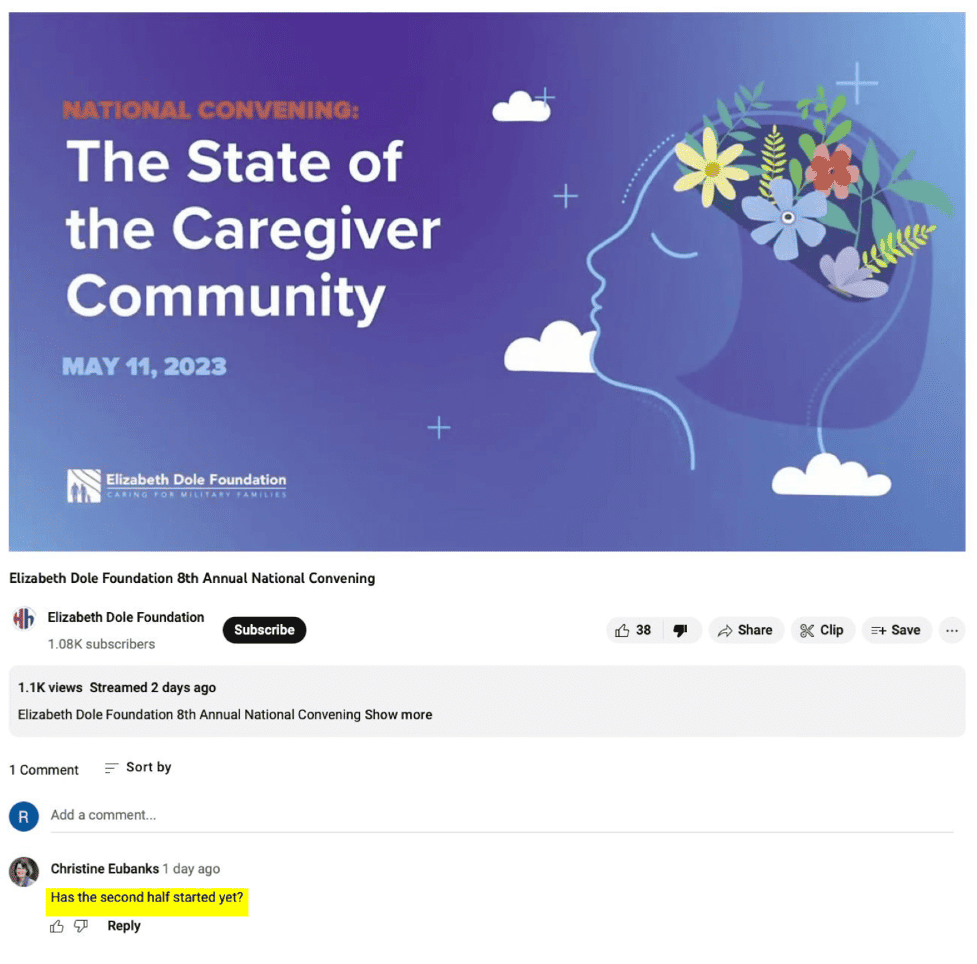
A cleverly disguised trick
Interestingly, there were claims that VA’s CVENT viewing platform wasn’t operational, and soon the Convening participants were forced to utilize EDF platforms where the nonprofit organization could control the narrative.
Most participants weren’t aware that they had been hidden.
On the user’s end, all seemed well. When logged into YouTube, the user’s comments appear in the live chat just like they should.
It wasn’t until the live chat replay was posted that folks became aware of the trickery. If you log out of YouTube and view the chat as a guest, your dissenting comments will not appear.
You were censored.
How they did it
There are several methods available to ensure that every part of the Convening’s conversation portrayed EDF in a positive light while keeping users engaged in the highlighted topics and unaware of the treachery.
First, EDF would have needed to appoint a moderator for the live chat. This individual would likely be an employee of the Dole Foundation who would monitor the live feed. The moderator could create a list of blocked keywords such as “Elizabeth Dole Act” or “PCAFC” that would alert moderators. It would even be possible to single out individuals that openly oppose the Dole Foundation with nothing more than a keyword with their given name.
Once alerted of the dissenter’s presence, EDF’s moderator would simply right-click to hide the user from the channel’s audience when the user failed to paint EDF in a positive light.
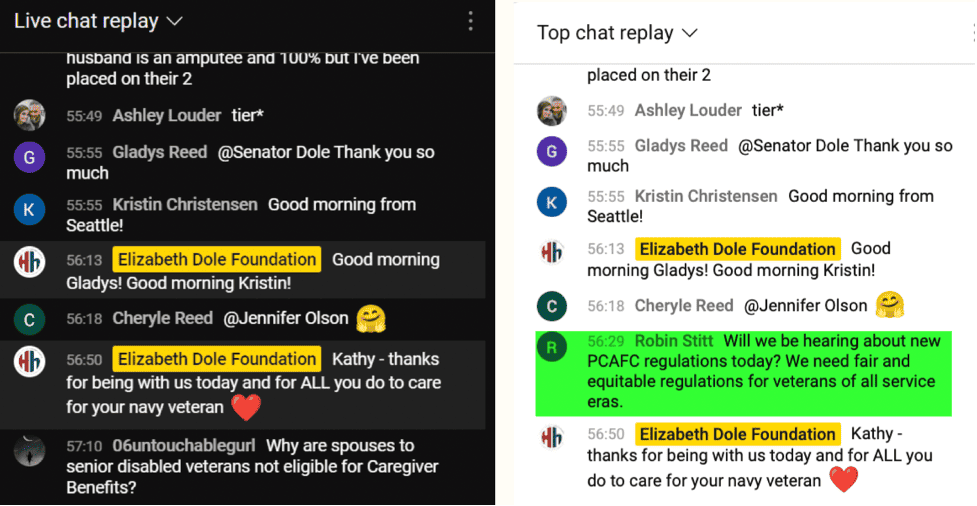
It appears community members who openly oppose the Dole Foundation are experiencing retaliation as they are now being blocked from accessing their government leaders at the Department of Veterans Affairs.
The National Annual Convening was hosted jointly by The Elizabeth Dole Foundation and the VA. Therefore, a formal inquiry was sent to both organizations for clarification. Dr. Colleen Richardson and Dr. Elnahal of VA responded quickly, stating neither was involved with the coordination of the Convening and that they would need to inquire with VEO and EDF about the matter.
At the time of this publication, Mr. Schwab and EDF have yet to respond.
A Worthwhile Challenge
Questions about The Elizabeth Dole Foundation’s ethics and censoring tactics have raised concerns about its ability to maintain the community’s trust.
How many more times can they violate this trust before the public stops supporting their mission, and in turn, the mission is tied to caring for veteran caregivers?
By EDF’s own admission, they claim this conversation is crucial, and the public presence would help ensure the needs of these families are heard and addressed, but it appears to only be true if you agree with the narrative.
Differing views are critical to ensure that all voices in this space can be heard.
The decision to remove public comments from a National Caregiver Convening jointly hosted by a government entity, the Department of Veterans Affairs, is concerning. It is viewed by some as an attempt to suppress free speech, which harms the credibility and trustworthiness of the Elizabeth Dole Foundation.
Therefore, I would challenge EDF to reconsider its decision to continue censoring the community and allow for open dialogue among all stakeholders, without trickery, by restoring all comments and unblocking all community members from all platforms.
Will the Dole Foundation accept this challenge, or will they continue to disenfranchise “Hidden Heroes” in the “Year of the Caregiver” by, in fact, hiding veteran caregivers?
Hidden Heroes takes on a whole new meaning when comments from veteran caregivers (Hidden Heroes) are hidden.
Conclusion
We thank Robin Stitt for sharing her observations and opinions about the profound effect the EDF/VA censorship impacted her and other veteran caregivers, military members, and veterans. While the opinions expressed by Stitt are her own, those in my community of veteran rights advocates are closely following this development.
For the past 4 years, Americans have experienced a tremendous uptick in censorship and all-out muzzling of dissenting views, especially when it comes to federal government agencies and concerns over how our tax dollars are being spent.
The experience above highlights a nuanced 1st Amendment issue where a joint event like the Caregiver Convening. Is it a violation of the Constitution and right to free speech when an event hosted jointly by a federal agency and one of their longtime partners censor participants?
Here, the censorship was not limited to salty sailor speech.
It was focused on removing citations to official government policies that reference a competing nonprofit, Veteran Warriors, where the host nonprofit, Elizabeth Dole Foundation, was jointly hosting the conference.
Is this okay when the target of the censorship decision-making is caregivers, soldiers, and veterans?
Is it okay, ever? If “Yes,” when?
These are questions the veteran caregiver community hopes to get answered through their partners.
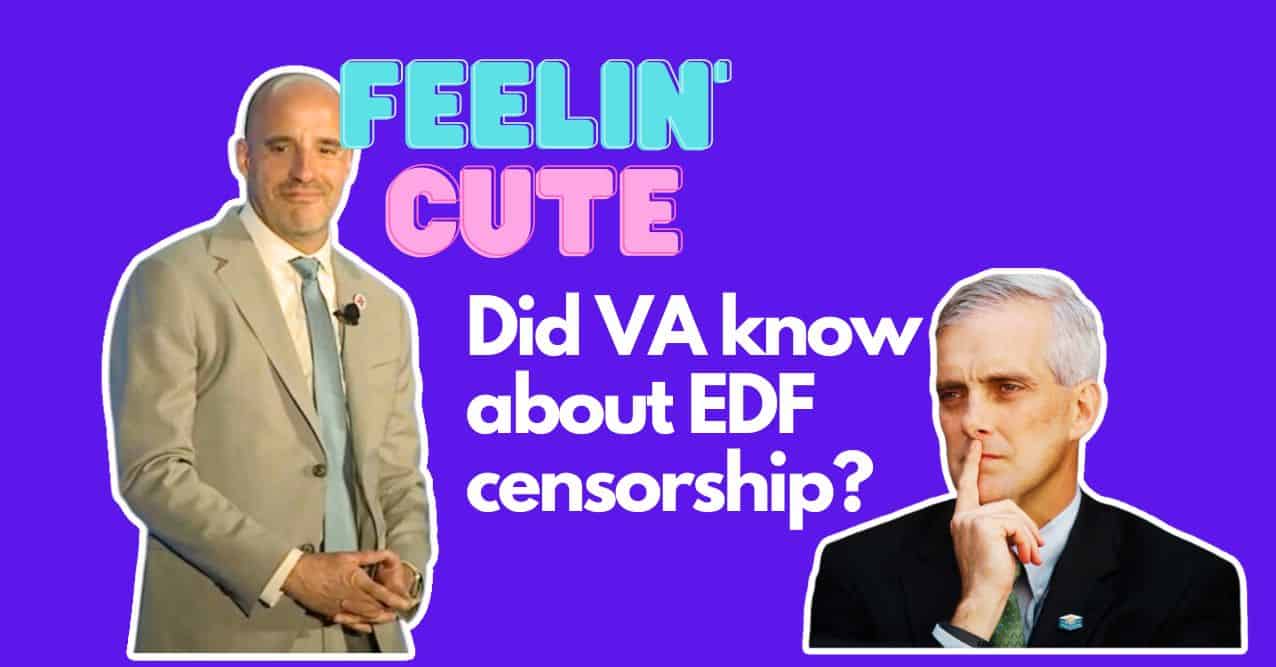

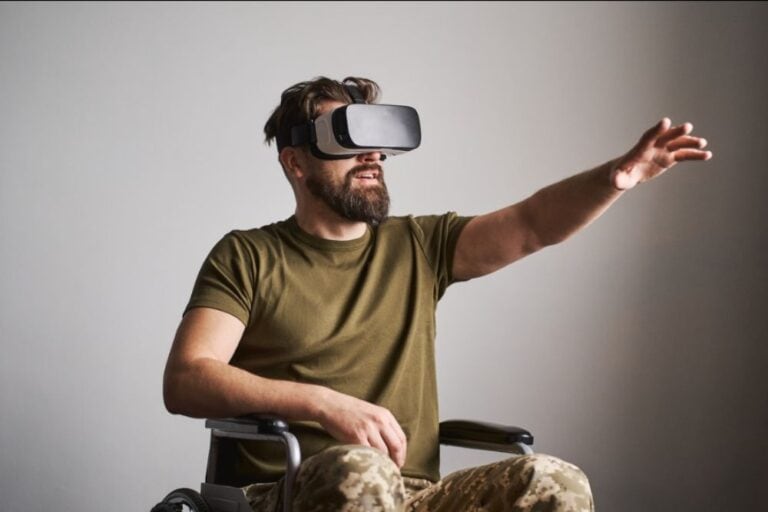

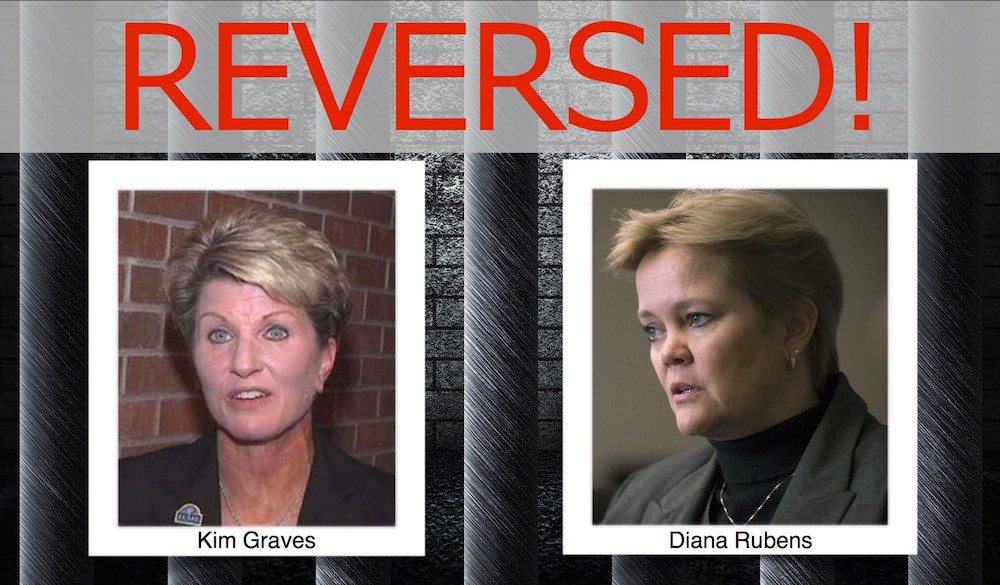
When you go to VA hospital for mental.. they gonna try to blame as much as humanly possible on YOU. They gonna ask about your behavior, your family history of mental, your family situation, your “other than military trauma,” your drug and booze use. All this is not to know best how to treat you, but to absolve themselves of responsibility if you leave and something happens…or to disqualify you from any kind of benefits that you might apply for. If you tell them about bad behavior..they gonna write it down.. even fishing for this information. If they can justify not being responsible for you or obligated to treat you.. they’ll use anything. History of bad behavior? Your medical record is gonna turn into something you would see if you were on federal probation. Meanwhile, they’re looking to send your ass somewhere and it ain’t there. On top of that, you can only get an appointment only once a month so wtf does it matter? Place is only worth free narcotics if you can get them… and even that they will use to insist you’re just an addict! Call prescriptions in 5 days early to make sure they order it and it arrives on time? They’ll insist you must have run out because you’re taking too many. I swear to Christ this is how it is. These people aren’t possible to deal with.
Mr. Krause,
You kicked butt in this one! thank you for such a well-rounded and informative assessment of the situation. what was a blur of scattered information before has now taken shape into identifying the players, the problems, and good resources.
Your attentive concern is certainly appreciated and needed by the veterans who are carelessly subjected to the herd mentality of non-vet politicians.
I’d like to think a resources link to field based facilitators from your homepage might be a useful resource for floundering vets and caretakers.
Thanks again for your articulation artistry and caring enough to post it.
Phil S
Censoring??? Since 2015 I’ve been trying to get help with the VA, threats, gas-lighting, denial of service and records from a local civilian hospital, refused X-rays due to the VA shattering my jaw back then pulling a tooth, and much more. I finally had to leave VA care and have experienced how far and deep corruption and evils run in this country and Indiana.
The group I was placed in back then were “ordered” in a specialty pain clinic for meds and “expected care” to sign gag-orders, confidentiality agreement contracts to continue on with VA care and keep pain med. Part of that agreement was to “never use civilian care again, Period.” Not for emergencies, wrecks, heart attacks, any thing, nothing ever. We were also told we would be expected per contract to try and accept any vaccine, drug, treatment, whatever, the VA, DOD, etc., wanted us to do or try. When signed we were told that we could be liable for even speaking of this document and agreement and care would end. I did not go back to sign that contract. I’ve also dealt with threats given by them like “good luck finding care or living in Indiana if you don’t sign this agreement.” Threats like “Whistle blowers do not do well in Indiana, you will not find any support.” This and much more….. “came from the top and state medical boards.”
Seems many are involved in some pay backs and gas-lighting. Last October I had burglars trapped in a out building and the police never came. Dispatch said she sent them out but I seen no-one and called her back. She hung up on me and ignored the issue. Again there had been no investigation over such things like this. County council people don’t care. I have wasted my time trying to get some attention over these issues but no-one cares. No media, got laughed at by local media types, tried every vet group out there, health and human services, so called whistle blower help sites, all my politicians and more across the nation and my state to no avail… just more attacks, thefts, harassment, gas-lighting, etc. Guess I am now “cancelled out” in America. Can’t trust anyone and the few of us trying to communicate have been censored, etc.
We are or can be lab-rats and no-cares. The whole sheebang is totally corrupt and all cover their own butts and “team-mates,” “Unions”. People out there, here, don’t have a clue how bad things really are or can be and how some people or vets are treated and what the machines out there can get by with.
Can’t believe you signed paperwork saying you’d do anything they wanted you to do as far as drugs and “experimental treatments.” Now you’re time is ticking away because they’re gonna do ECT or antipsychotics and you’ll be virtually dead at that point. Sitting in a chair at home like a vegetable degenerating to a husk. You won’t be much trouble for them then will you? Hell, you’ll be lucky if you aren’t completely skeletonized when they finally find you one day.
Could do $2000 a month Universal Basic Income for service people… and just wrap up the whole shit show. Then people could just buy health insurance and go anywhere, pay for education, housing, food, you name it. This could be done for everyone in USA really if they would just tax appropriately. The money goes around in a big loop anyway, and with UBI, the variety of things that people would do with the money wouldn’t raise prices significantly. As long as they are taxing it away, they can keep it going and this would also eliminate SNAP, Social Security, VHA and VBA, you name it.
Yeah told them I was living in me moms basement and going to jail every Friday. They cut my PTSD check. I guess that’s the intersectionality of medicine and politics. I will sue, use the money to move out of me moms basement, and sue again because they lied to begin with.👍
Need surgery and they won’t do it. Can’t do a thing…not work, not play, barely can drive. They need euthanasia services at VA if they’re just gonna let people rot to death. Rather be off benefits and working than just sit here and die in pain. If I had a su**ide vest I’d put it on and go to VA and that would be the end.
Did you reach out to your local congressional office . They can get results in days. The VA is a disaster and nothing changes
They are the ones who won’t fund the VA! Why would I think they would do anything about the denial of care? Also, same charlatans complain to the FBI about “weaponization of the federal government” but they continue to vote for The Patriot Act and don’t close loopholes to 4th Amendment violations. They GOP especially are just lawyers for the rich! It’s all a big clown show! They all occupy seats to feed themselves and the rich and protect one another.
A Veteran is NEVER allowed/authorized to complain about anything the v.a. does or doesn’t do. NOT even to their providers!!!
The v.a. DOES NOT treat the Veterans well at all!!!
The v.a. DOES neglect Veterans and the caregivers of those Veterans!
The v.a. DOES receive copious amounts of bonuses at fiscal year end for NEGLECTING Veterans saving large amounts of monies to ensure they receive EXTRA LARGE bonuses!!!!!!!!!!!!!!!!!!!!!!!!
Thank you for keeping us up to date on Caregivers.
I really believe it’s saving money for VA rather than putting our loved veteran in a home.